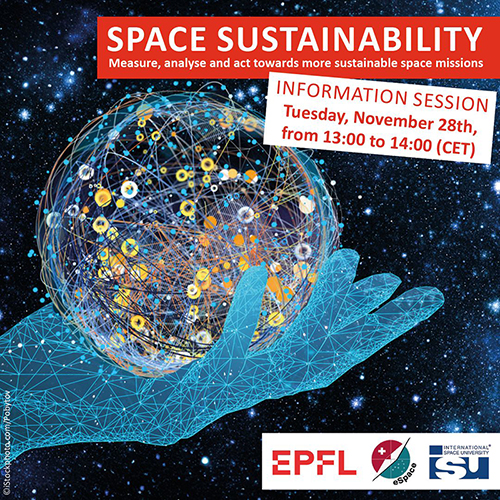
- This event has passed.
Information Session: Space Sustainability Continuing Education Course

Join us on November 28 for an Informational Session on our upcoming continuing education course, Space Sustainability: How to design more sustainable missions?
This session will provide a high-level overview of what Space Sustainability means: understand how can we secure the long-term usability of space and, how can we design and operate missions and space businesses with a keen focus on sustainability.
Target audience: Space stakeholders (engineers, scientists, non technical managers, policy practitioners etc), active in space agencies, aerospace industries or related fields and concerned about preserving the sustainability and safety of the space environment in the long-term
In recent years, the exponential growth of spatial activities, driven in part by theexpanding commercial use of space, has yielded promising business opportunities.However, this expansion has also left behind a significant challenge – an ever-increasing population of space debris, with over 28,000 objects currently observablein Earth's orbit. How can we secure the long-term usability of space and designspace businesses and missions with a focus on sustainability?
Space Sustainability is a new EPFL short program designed to:
Understand what space sustainability means (from historical, geopolitical,economic, societal, and environmental perspectives) and how to measure it
Explore tools and methodologies for developing more sustainable spacemissions (ESA's MASTER and DRAMA suite, Space Sustainability Rating, LifeCycle Assessment & Environmental Impact Assessment, etc.)
Interact with the most recent research developments and explore the potentialadvantages of incorporating Environmental Social Governance (ESG) and Corporate Social Responsibility (CSR) strategies within the space sector
This course is organized by EPFL Space Center (eSpace), EPFL (Swiss FederalInstitute of Technology in Lausanne) in collaboration with International Space University (ISU), IMS Space Consultancy and Massachusetts Institute of Technology (MIT).The program is designed for individuals engaged in space-related roles (engineers, scientists, non-technical managers, policy practitioners, etc.) and whoshare a common focus on ensuring the long-term sustainability and safety of thespace environment.
This course will take place March 19-21, 2024.